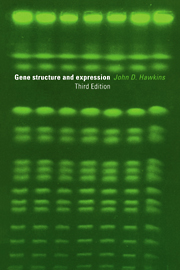Book contents
- Frontmatter
- Contents
- Introduction to the third edition
- Introduction to the second edition
- Introduction to the first edition
- List of abbreviations
- 1 Deoxyribonucleic acid (DNA)
- 2 Ribonucleic acid (RNA)
- 3 Methodology
- 4 Prokaryotic DNA replication and gene expression
- 5 The operon concept
- 6 Eukaryotic gene organisation and replication
- 7 Eukaryotic transcription
- 8 Post-transcriptional processing of RNA
- 9 Oncogenes
- 10 Haemoglobin
- 11 Proteins of the immune system
- 12 Some gene families
- 13 Mitochondrial and chloroplast genomes
- 14 Different and evolving genomes
- Glossary
- Reading lists
- Index
3 - Methodology
Published online by Cambridge University Press: 05 June 2012
- Frontmatter
- Contents
- Introduction to the third edition
- Introduction to the second edition
- Introduction to the first edition
- List of abbreviations
- 1 Deoxyribonucleic acid (DNA)
- 2 Ribonucleic acid (RNA)
- 3 Methodology
- 4 Prokaryotic DNA replication and gene expression
- 5 The operon concept
- 6 Eukaryotic gene organisation and replication
- 7 Eukaryotic transcription
- 8 Post-transcriptional processing of RNA
- 9 Oncogenes
- 10 Haemoglobin
- 11 Proteins of the immune system
- 12 Some gene families
- 13 Mitochondrial and chloroplast genomes
- 14 Different and evolving genomes
- Glossary
- Reading lists
- Index
Summary
Preparation of DNA samples for investigation
In many investigations of DNA, fragments have been excised from their natural chromosomal sites and incorporated into larger pieces of DNA that can replicate autonomously in various kinds of cells. These will produce copies of the original fragments in large enough quantities and in a pure enough state for further study.
DNA can be obtained for these purposes in three main ways:
By enzymic synthesis on an RNA template using the enzyme reverse transcriptase (Chapter 3.5) to produce complementary DNA.
By the action of restriction endonucleases (Chapter 3.7) for hydrolytic cleavage at specific sites.
By chemical synthesis that can be automated to produce oligonucleotides 50–100 nt long in a reasonable time. This method only makes fragments smaller than those produced by the other methods, some of which can yield pieces of DNA up to at least 60,000 nt long.
DNA made in this way is ligated to the DNA of an independently replicating vector that will grow when introduced into appropriate cells (Chapter 3.2) to yield clones of cells infected with a particular type of DNA. Hence the technique is often referred to as cloning of DNA. The artificially produced DNA is called recombinant DNA since it will have been combined from two sources for its production.
The polymerase chain reaction is a very elegant method for synthesising relatively large quantities of a particular DNA sequence.
Information
- Type
- Chapter
- Information
- Gene Structure and Expression , pp. 37 - 57Publisher: Cambridge University PressPrint publication year: 1996
